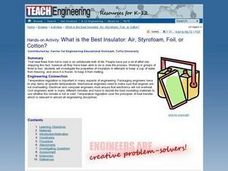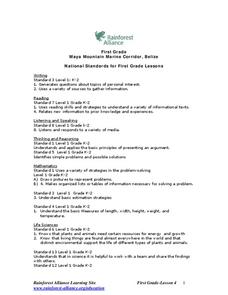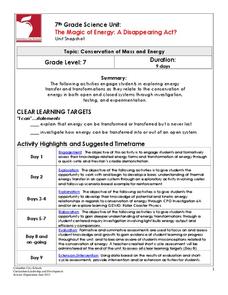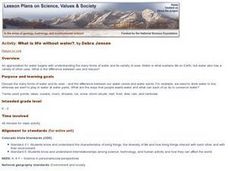Curated OER
I'm Warm Now
Third graders graph how much water is wasted while waiting for it to get warm in the spigot in the sink. In this graphing lesson plan, student first predict how much water is wasted. That night they test it out at home and the next day...
Curated OER
The "Laws" and Principles of Chemical Reactions
In this chemical reaction principles worksheet, students read about definite proportions and the law of conservation of mass. Students read about how to balance a chemical equation. Then students complete 20 fill in the blank, 2 short...
Curated OER
What is the Best Insulator: Air, Styrofoam, Foil, or Cotton?
Students investigate the properties of insulators by attempting to keep a cup of water from freezing, and once it is frozen, to keep it from melting. They conduct the experiment, record and analyze the results, and answer discussion...
Curated OER
Who Takes Care of the Maya Forest Corridor?
First graders study the animals in the Maya Forest Reserve. In this conservation lesson, 1st graders create a graph to compare the environment of animals to their own. They design a 3D model of these two environments.
Curated OER
Where's the Drip?
Students detect water leaks. In this water conservation ecology lesson, students take a tour of the school grounds and identify sources of water and possible leaks. Students report leaks to the custodian and administration.
Curated OER
Tale of a Tuna
Junior marine biologists access the International Commission for the Conservation of Atlantic Tunas' data on Atlantic Bluefin Tuna catches. As they analyze the data, they answer three questions. Background information and links to...
Curated OER
Water and Ice
Students explore the states of water. In this water states lesson, students observe ice over time and the changes that take place. Students read a related text and draw their observations in a journal entry. Students discuss the...
Curated OER
Soils, Water and Erosion
Students participate in a hands-on experiment to compare how water and soil erosion affect soil and grass. They determine how slope affects erosion and how terracing affects erosion. They write a paragraph summarizing their data.
Cornell University
Chemical Reactions
Investigate the Law of Conservation of Mass through a lab exploration. Individuals combine materials to initiate chemical reactions. They monitor for signs of reactions and measure the masses before and after the reactions for...
Cornell University
Predicting Chemical Reactions
Prove the Law of Conservation of Mass through a lab investigation. A well-designed lesson asks groups to combine materials and monitor indicators for chemical reactions. Measuring the mass of the reactants and products allows individuals...
Serendip
How Do Biological Organisms Use Energy?
When an organism eats, how does food become energy? Young biologists follow glucose through the process of cellular respiration to the creation of ADP using a discussion-based activity. The resource also highlights conservation of mass...
Columbus City Schools
The Magic of Energy: A Disappearing Act?
Using the 5E method for teaching about kinetic energy, potential energy, and conservation of energy, this two-week unit with many videos and possible extensions is sure to keep pupils engaged as they are learning.
Science Matters
Peanut Energy
How do humans get energy since they aren't mechanical and can't photosynthesize? Learners explore this question by relating potential energy in food to human energy levels. Scholars measure the change in mass and a change in...
Project WET Foundation
The Blue Planet
What a neat interactive that interacts with the amount of water on Earth's surface. It begins with a brief audio introduction of the Blue Planet and how it got its name. Then, users click on the activity to play a game...
Beyond Benign
Ecological Footprint
How does your lifestyle measure up in terms of your ecological footprint? Young ecologists examine their impact on the planet using an insightful online calculator. A short quiz asks users to rank the size of their homes, their energy...
Messenger Education
Give Me a Boost—How Gravity Assists Aid Space Exploration
The propellant needed for space explorations runs in the thousands, while paying to get the craft into orbit costs millions! In the second installment of three, two activities explore laws of conservation of energy and momentum. Using...
Curated OER
The Conservation Of Mass (The Mass Of Gas)
Students gain an understanding of matter in all of its phases. In this science lesson plan, students further their knowledge of the laws of conservation of mass, the loss in mass can be accounted for, when the gas is allowed to escape...
Curated OER
Environmental Issues
In this environmental issues learning exercise, students respond to 14 different types of questions divided into 3 sections. First, they define global warming and give an example of what they can do to slow it. Then, students define 4...
Curated OER
Conservation in Costa Rica
Students brainstorm what they do that requires land use and use a worksheet to calculate their footprint (the total area of land and water required to produce all the resources they consume). They then compare their footprints to each...
Curated OER
Paper Makers
Students make recycled paper out of scrap paper, water, and leaves. In this natural resources lesson plan, students learn about conservation of the forest and how we can use recycled paper to fuel our paper supply.
Curated OER
Waterdrops Growth and Development
In this environment worksheet, students read an article about population growth and development. They describe a few ways that people in their neighborhood could use less water. Students also read a short article about desal and then,...
Curated OER
Water Conservation
Learners create short videos about water conservation using the computer program iMovie in this cross-curricular instructional activity provided by the Florida Center for Instructional Technology.
Curated OER
What is Life Without Water?
Students differentiate between how they use water in response to a need and how they use water for pleasure. They read books about water, participate in class discussion and illustrate their observations.
Curated OER
Water You Can Use from the Air Conditioner
Students work together to research water quantity, quality and safety standards. They complete a lab to discover how to use the water from an air conditioner. They write a paper to show their findings.
Other popular searches
- Conserving Water Resource
- Conserving Water Environment
- Conserving Water Diagram
- Earth Day Conserving Water
- Conserving Water Worksheet























